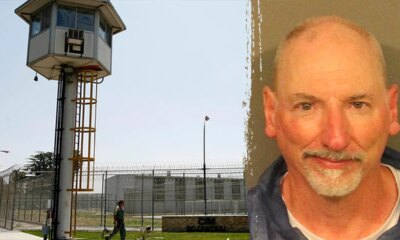California
California to use generative AI to improve services, cut traffic jams

California could soon deploy generative artificial intelligence tools to help reduce traffic jams, make roads safer and provide tax guidance, among other things, under new agreements announced Thursday as part of Governor Gavin Newsom’s efforts to harness the power of new technologies for public services.
The state is partnering with five companies to create generative AI tools using technologies developed by tech giants such as Microsoft-backed OpenAI and Google- and Amazon-backed Anthropic that would ultimately help the state provide better services to the public, administration officials said.
“It is a very good sign that a lot of these companies are putting their focus on using GenAI for governmental service delivery,” said Amy Tong, secretary of government operations for California.
The companies will start a six-month internal trial in which state workers test and evaluate the tools. The companies will be paid $1 for their proposals. The state, which faces a significant budget deficit, can then reassess whether any tools could be fully implemented under new contracts. All the tools are considered low risk, meaning they don’t interact with confidential data or personal information, an administration spokesperson said.
Newsom, a Democrat, touts California as a global hub for AI technology, noting 35 of the world’s top 50 AI companies are located in the state. He signed an executive order last year requiring the state to start exploring responsible ways to incorporate generative AI by this summer, with a goal of positioning California as an AI leader.
In January, the state started asking technology companies to come up with generative AI tools for public services. Last month, California was one of the first states to roll out guidelines on when and how state agencies could buy such tools.
Generative AI, a branch of AI that can create new content such as text, audio and photos, has significant potential to help government agencies become more efficient, but there’s also an urgent need for safeguards to limit risks, state officials and experts said. In New York City, an AI-powered chatbot created by the city to help small businesses was found to dole out false guidance and advise companies to violate the law. The rapidly growing technology has also raised concerns about job losses, misinformation, privacy and automation bias.
While state governments are struggling to regulate AI in the private sector, many are exploring how public agencies can leverage the powerful technology for public good. California’s approach, which also requires companies to disclose what large language models they use to develop AI tools, is meant to build public trust, officials said.
The state’s testing of the tools and collecting of feedback from state workers are some of the best practices to limit potential risks, said Meredith Lee, chief technical adviser for the University of California-Berkeley’s College of Computing, Data Science and Society. The challenge is determining how to assure continued testing and learning about the tools’ potential risks after deployment.
“This is not something where you just work on testing for some small amount of time and that’s it,” Lee said. “Putting in the structures for people to be able to revisit and better understand the deployments further down the line is really crucial.”
The California Department of Transportation is looking for tools that would analyze traffic data and come up with solutions to reduce highway traffic and make roads safer. The state’s Department of Tax and Fee Administration, which administers more than 40 programs, wants an AI tool to help its call center cut wait times and call length. The state is also seeking technologies to provide non-English speakers information about health and social services benefits in their languages and to streamline the inspection process for health care facilities.
The tools are to be designed to assist state workers, not replace them, said Nick Maduros, director of the Department of Tax and Fee Administration.
Call center workers there took more than 660,000 calls last year. The state envisions the AI technology listening along to those calls and pulling up specific tax code information associated with the problems callers describe. Workers could decide whether to use the information.
Currently, call center workers have to simultaneously listen to the call and manually look up the code, Maduros said.
“If it turns out it doesn’t serve the public better, then we’re out $1,” Maduros said. “And I think that’s a pretty good deal for the citizens of California.”
Tong wouldn’t say when a successfully vetted tool would be deployed, but added that the state was moving as fast as it can.
“The whole essence of using GenAI is it doesn’t take years,” Tong said. “GenAI doesn’t wait for you.”

California
More SoCal rallies for and against military action in Iran expected on Sunday and Monday

LOS ANGELES (KABC) — Worshippers across Los Angeles were met with an increased law enforcement presence on Sunday as police and sheriff’s deputies stepped up patrols outside mosques, synagogues and cultural landmarks following the strikes on Iran.
Local officials said there are no credible threats to Southern California, but the Los Angeles Police Department and the Los Angeles County Sheriff’s Department heightened visibility as a precaution to ensure communities stay safe.
More demonstrations tied to the attack on Iran are expected Sunday and Monday. Several protests were held across Southern California on Saturday.
READ MORE | Rallies for and against military action in Iran draw demonstrators across Southern California
While Iranian-Americans celebrated in Westwood, protesters gathered in downtown Los Angeles to oppose the Trump administration’s attacks against Iran.
While some groups gathered in downtown Los Angeles to protest the strikes, others assembled in Westwood to celebrate “the fall of the Ayotollah,” according to organizers.
Authorities said they will continue monitoring events as the region prepares for additional gatherings in the days ahead.
This is a developing story. This article will continue to be updated as more information becomes available.
Copyright © 2026 KABC Television, LLC. All rights reserved.
California
San Jose Mayor Matt Mahan officially announce run for California governor

Watch CBS News
California
Six planets to align in “planetary parade” above California. Here’s how to see it.

A rare celestial event will be taking place in the sky above California on Saturday night, as six planets are expected to be visible in what is being called a “planetary parade.”
Look towards the western horizon 30-60 minutes after sunset. Mercury, Venus, Jupiter, and Saturn will all be lined up along an arc, visible to the naked eye creating a literal parade of planets.
The alignment only occurs every few years, with the next one not until 2028.
Mars, Jupiter, and Saturn are frequently seen in the night sky, but the addition of Venus and Mercury make this planet lineup particularly noteworthy.
In the San Francisco Bay Area, there will be some cloud coverage Saturday evening, but it should be in the high levels of the atmosphere so hopefully the horizon remains clear. In Los Angeles and San Diego, the forecast is expected to be clear.
Meanwhile, the planetary parade may not be visible in the northern part of the state, with cloudy conditions expected Saturday night in Sacramento, and possible showers and thunderstorms in Eureka and Redding.
People with telescopes and binoculars will also be able to see Uranus and Neptune as well.
For amateur astronomers, this also would be a fun time to test out your telescope skills by checking out Jupiter’s many moons or Saturn’s rings.
Please note that if your view is obscured by buildings, trees or hills, you won’t see the parade because it will appear very low on the horizon.
The nontechnical term is Parade of Planets, but the technical term is planetary alignment. Basically, it’s just the name for what happens when the planets and sun line up in the sky, these happen during events called oppositions and conjunctions.
Opposition is the term for when a planet is directly opposite the Earth from the Sun. Meanwhile, conjunction is when they are aligned with each other and is when we get the best views of the planets.
-

 World4 days ago
World4 days agoExclusive: DeepSeek withholds latest AI model from US chipmakers including Nvidia, sources say
-

 Massachusetts4 days ago
Massachusetts4 days agoMother and daughter injured in Taunton house explosion
-

 Montana1 week ago
Montana1 week ago2026 MHSA Montana Wrestling State Championship Brackets And Results – FloWrestling
-

 Denver, CO4 days ago
Denver, CO4 days ago10 acres charred, 5 injured in Thornton grass fire, evacuation orders lifted
-

 Louisiana7 days ago
Louisiana7 days agoWildfire near Gum Swamp Road in Livingston Parish now under control; more than 200 acres burned
-

 Technology1 week ago
Technology1 week agoYouTube TV billing scam emails are hitting inboxes
-

 Politics1 week ago
Politics1 week agoOpenAI didn’t contact police despite employees flagging mass shooter’s concerning chatbot interactions: REPORT
-

 Technology1 week ago
Technology1 week agoStellantis is in a crisis of its own making























